#Basics of digital marketing
Text
Effective Digital Marketing and It's Strategies for Success
Digital marketing is the practise of using online platforms and channels to communicate with a target audience to promote goods and services. A variety of techniques are used, including as search engine optimisation (SEO), social media marketing, content marketing, email marketing, and others. Reaching out to potential customers is the main objective, and using digital tools and techniques will improve engagement, leads, and sales.
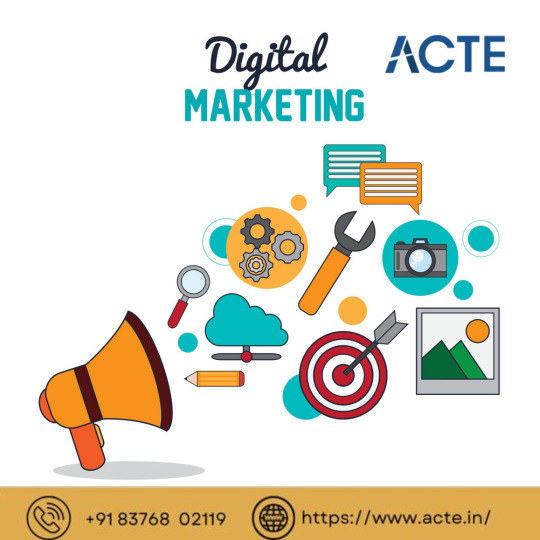
To survive and remain competitive in the modern economy, businesses now depend heavily on digital marketing. By using the power of online platforms, businesses may increase website traffic, sales, and brand visibility. Through the use of digital marketing, you can precisely target your audience, track the effectiveness of your advertisements in real-time, and make data-driven decisions to maximise your marketing efforts. Companies may effectively engage with their audience, forge connections, and communicate the benefits of using digital marketing techniques. Join a training institute that offers complete training programmes in digital marketing to help students build the skills essential to succeed in this fast-paced sector. If you'd want to get better at digital marketing or if you need help understanding the complicated world of digital marketing.
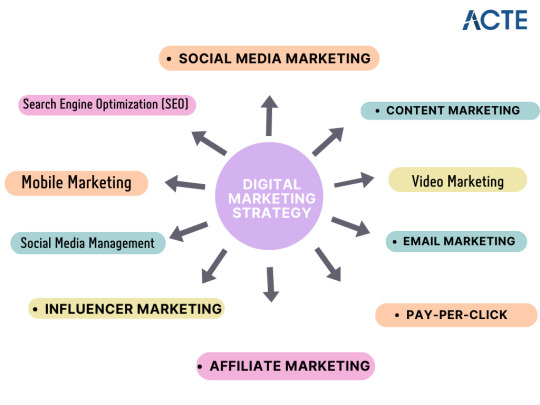
Search Engine Optimization (SEO): Enhancing websites to achieve higher rankings on search engines such as Google, aiming to increase visibility among potential audiences.
Social Media Marketing: Leveraging platforms like Facebook, Instagram, Twitter, and others to establish connections and foster engagement with target demographics.
Content Marketing: Crafting and disseminating valuable content such as blogs, videos, and infographics, with the intent of attracting and retaining customer interest.
Email Marketing: Strategically sending targeted emails to inform and engage customers regarding product updates, offers, and pertinent news.
Pay-Per-Click (PPC) Advertising: Placing ads on search engines and websites, with payment occurring only upon user clicks.
Affiliate Marketing: Collaborating with partners to endorse products, with compensation based on generated sales.
Influencer Marketing: Collaborating with social media influencers to endorse products to their follower base.
Online PR: Employing online platforms to manage brand reputation and connect with media outlets.
Social Media Management: Curating, scheduling, and analysing social media content to effectively engage and resonate with audiences.
Analytics and Data Analysis: Collecting and dissecting data to glean insights into consumer behaviour, refining marketing strategies accordingly.
Online Advertising: Displaying advertisements on websites, applications, and social media platforms to bolster brand visibility.
Mobile Marketing: Tailoring marketing endeavours to optimize engagement on mobile devices and within applications.
Video Marketing: Utilizing video content to showcase products or services on platforms like YouTube and social media.
Remarketing: Strategically targeting individuals who have previously interacted with a website or its content through ad displays.
Chatbot Marketing: Harnessing AI-driven chatbots to engage with customers on websites and social media channels.
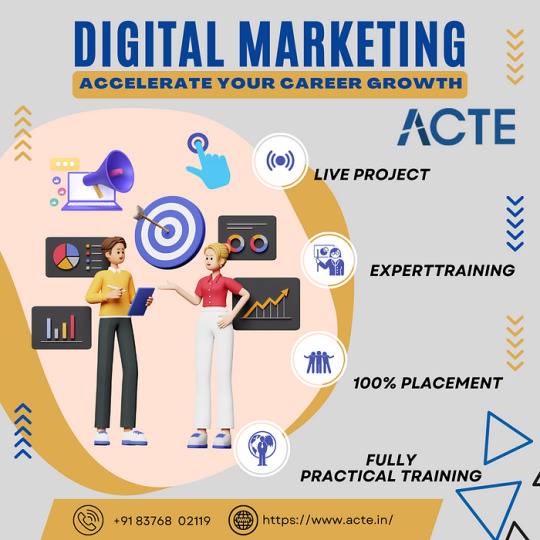
Digital marketing, the practise of promoting products online, is crucial for firms in the current world. It involves things like optimising websites for search engines, utilising social media sites like Facebook, producing interesting content, sending promotional emails, and more. Learning digital marketing can help businesses succeed as they continue to use the internet to engage with consumers by getting them to notice them, like their brand, and buy their products.
#digtal marketing#what is digital marketing#digital marketing tools#marketing#basics of digital marketing
11 notes
·
View notes
Text
Become a Digital Marketing Pro: Learn the Basics NOW!
What is Digital Marketing?
Digital Marketing refers to the marketing of products and services of a company or business through digital channels such as search engines, websites, email, social media, mobile apps, etc. It involves the use of electronic devices and the internet. Digital marketing is often referred to as online marketing, internet marketing or web marketing.
Digital marketing mainly comprises Search Engine Optimization (SEO), Social Media Optimization (SMO), and Search Engine Marketing (SEM). We can say that it can be divided into three parts SEO, SMO, and SEM. However, Email Marketing and Affiliate Marketing have also become important components of digital marketing over the past few years. So, in digital marketing, we mainly deal with the following components:
SEO
SMO
SEM
Email Marketing
Affiliate Marketing
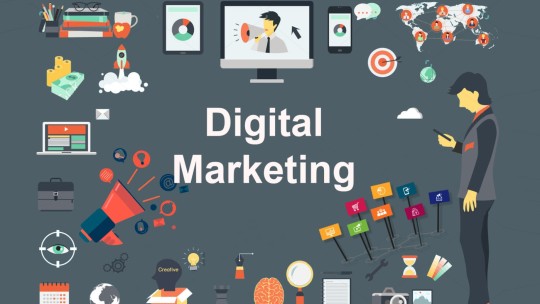
Why choose Digital Marketing?
Non-Digital Marketing, which is the traditional means of marketing, includes the usage of physical means of marketing. These are generally in the form of physical prints such as posters, flyers, newspaper advertisements, and billboards. Even at the first glance, it is quite apparent why almost every business is choosing to get into Digital Marketing.
The primary and the most fundamental reasoning for this is the amount of reach that is possible with it. There are smart devices everywhere, from televisions, laptops, computers, and tablets to smartphones. Even cars have smart systems enabled in them where you can access the Internet. All of these facilities present a blank canvas for advertising your brand.
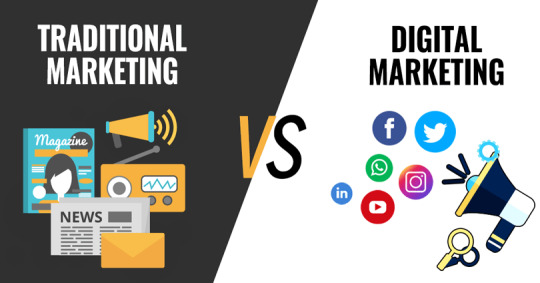
How does Digital Marketing work?
There are two ways in which Digital Marketing is implemented by brands and businesses:
B2C (Business to Customer)
B2B (Business to Business)
B2C (Business to Customer):
When a brand or a company has to sell a product or service to individual customers. In fact, 95 percent of the time, the ads and marketing that you see online are examples of B2C campaigns, e.g., an ad for a candy bar, a promotional video for a safety razor, or a movie trailer. All of these marketing efforts are targeting individual consumers and not organizations.
B2B (Business to Business):
B2B is conducted for very specific products. You wouldn’t generally see B2B products being advertised on platforms with traffic from the everyday crowd. These marketing campaigns are low profile, professional, and in most cases, marketed directly (or pitched) to the client. This client can be a small business or a corporate giant. We can take heavy-duty cooking machinery used in big fast-food restaurants as an example. What would be the point of running a TV ad for an industry-level chimney? None. This sort of marketing is done through B2B-specialized salesmen who use custom-made marketing material, PowerPoint presentations, and word of mouth to pitch their product.

Not surprisingly, billions of marketing dollars spent on traditional channels is already starting to shift to digital marketing campaigns and this will continue to increase as the Web matures.
#digital marketing#digital marketing from basics#Introduction to digital marketing#how to learn digital marketing#what is digital marketing#online marketing#affiliate marketing#Basics of digital marketing#Why choose digital marketing#How does digital marketing work#learn digital marketing#Email marketing#search engine optimisation#seo#seo marketing
13 notes
·
View notes
Text
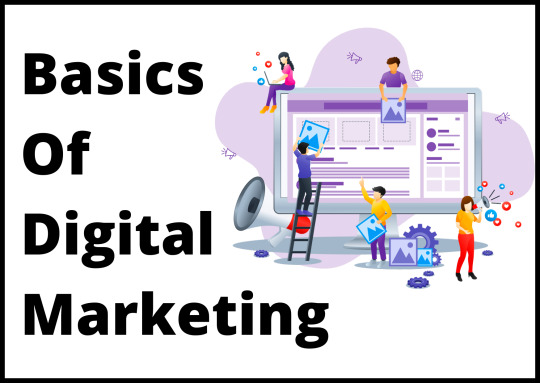
Hello friends we're now working on our new project
in this, we're developing a free digital marketing course with 8 modules and more than 45 lessons.
#learn digital marketing#digital marketing agency#basics of digital marketing#earn online#blogging#tumbler#twitter
3 notes
·
View notes
Text
Digital Marketing and its Importance in the Future Business World
I. The Evolution of Digital Marketing
Introduction to Digital Marketing
Digital marketing refers to the use of digital channels, such as social media, email, search engines, and websites, to connect with current and potential customers. It involves various strategies like content marketing, SEO, social media marketing, PPC advertising, and more to reach target audiences and drive engagement. The main objectives include increasing brand awareness, driving website traffic, and generating leads. Key digital marketing channels encompass social media, email, search engines, and content marketing.
History of Digital Marketing
The rise of the internet revolutionized marketing by shifting focus to online platforms. Strategies have evolved from basic banner ads to sophisticated data-driven approaches. The advent of social media further transformed how companies engage with their audience. Over the years, digital marketing has evolved significantly. Initially, it focused on email marketing and website banner ads. With advancements in technology, it expanded to include social media marketing, influencer marketing, video marketing, and personalized content. The evolution of digital marketing has provided businesses with more opportunities to engage with their audience in a meaningful way.
Importance of Digital Marketing in the Modern Era
Digital marketing has revolutionized traditional advertising, making it more targeted and measurable. The online shift in consumer behaviour has reshaped how businesses interact with their customers.
Digital Marketing in the Pre-Pandemic World
Before the pandemic, digital marketing was already on the rise, with businesses increasingly investing in online platforms. The focus was on creating a strong online presence, building brand awareness, and driving website traffic. Companies were leveraging social media and digital advertising to reach their target audience effectively.
Digital Marketing in the Post-Pandemic World
The COVID-19 pandemic accelerated the shift towards digital marketing. With physical stores closed and people spending more time online, businesses had to adapt quickly to engage with their customers. E-commerce saw a massive surge, leading to an increased reliance on digital marketing strategies like online advertising, email marketing, and social media promotion.
Adoption of Different Digital Marketing Strategies by Various Companies
Different companies have adopted various digital marketing strategies based on their goals and target audience. Some have focused on SEO to improve their website's visibility, while others have invested in social media marketing to build brand loyalty. Email marketing has been another popular choice for companies looking to nurture leads and drive conversions.
II. Key Components of a Successful Digital Marketing Strategy
Website Optimization
User-friendly and mobile-responsive websites are crucial for enhancing the user experience.
Strategies for optimizing content and SEO play a vital role in driving organic traffic.
Social Media Marketing
Leveraging social media platforms is essential for brand visibility and customer engagement.
Building brand loyalty through authentic interactions is key in social media marketing.
Email Marketing
Personalized email campaigns help nurture leads and maintain customer relationships.
Effective strategies for email marketing involve segmentation, automation, and A/B testing.
III. Future Trends in Digital Marketing
Artificial Intelligence in Marketing
AI technology allows for personalized customer experiences and efficient marketing automation.
Predictive analytics powered by AI can anticipate consumer behaviour and improve targeting.
Video Marketing
Video content has become a dominant marketing tool for capturing audience attention.
Incorporating video in digital strategies can increase engagement and conversion rates.
Voice Search Optimization
The rising popularity of voice search demands content optimization for voice-enabled devices.
Strategies such as using long-tail keywords and optimizing site speed are crucial for voice search.
IV. The Impact of Digital Marketing on Business Growth
Reach and Engagement
Digital marketing expands the reach of businesses beyond geographic boundaries.
Targeted campaigns enhance customer engagement and foster brand loyalty.
Data-Driven Decision Making
Data analytics enables businesses to make informed marketing decisions based on real-time insights. Measuring ROI and analysing campaign performance are essential for optimizing marketing strategies.
One of the key advantages of digital marketing is the ability to track and analyse consumer behaviour in real-time. Data-driven marketing enables them to gain valuable insights into their target audience's preferences, demographics etc.
By leveraging this data, companies can optimize their marketing efforts, personalize their messaging, and ultimately drive higher ROI.
For example, by analysing website traffic and user interactions, businesses can identify which marketing campaigns are driving the most conversions and adjust their strategy accordingly.
Additionally, social media analytics tools allow companies to track engagement metrics, such as likes, shares, and comments, to gauge the effectiveness of their campaigns. This data-driven approach not only helps businesses better understand their audience but also enables them to make informed decisions about their marketing strategy.
The Rise of Influencer Marketing
In recent years, influencer marketing has emerged as a powerful strategy for businesses to reach their target audience in an authentic and engaging way. Influencers, who have a loyal following on social media platforms, can help companies promote their products or services to a larger audience and drive brand awareness.
Collaborating with influencers allows businesses to tap into their audience and leverage their credibility and trust. By partnering with influencers whose values align with their brand, companies can create compelling content that resonates with their target demographic. This form of word-of-mouth marketing can be highly effective in driving customer engagement and increasing brand visibility in the digital space.
Adapting to the Digital Landscape
As we look towards the future, digital marketing will continue to play a vital role in shaping the business landscape. Companies that embrace digital marketing strategies and adapt to the ever-changing digital landscape will have a competitive edge in reaching their target audience and driving business growth.
To stay ahead of the curve, businesses must invest in digital marketing tools and technologies that allow them to connect with their audience on a more personal level. Whether it is through targeted advertising on social media platforms or personalized email campaigns, companies must be proactive in engaging with their customers and building lasting relationships.
The Importance of Content Marketing
Content marketing is a cornerstone of any successful digital marketing strategy. By creating high-quality, relevant content that resonates with their audience, businesses can position themselves as industry leaders and establish credibility in the market. Whether it is through blog posts, videos, or infographics, engaging content can drive traffic to a company's website, increase brand awareness, and ultimately lead to conversions.
Moreover, content marketing is an effective way for businesses to demonstrate their expertise and educate their audience about their products or services. By providing valuable information and insights, companies can build trust with their customers and foster long-term relationships. In the digital age, content is king, and businesses that invest in creating compelling content will reap the rewards in terms of increased brand visibility and customer engagement.
Opportunities for Digital Marketers in the Future Business World
As businesses continue to prioritize digital channels, the demand for skilled digital marketers is expected to rise. There will be opportunities in areas like data analysis, content creation, social media management, and digital advertising. Digital marketers who stay updated with the latest trends and technologies will be in high demand in the future business world.
Conclusion: Embracing the Digital Revolution
As we navigate the digital landscape of the future, digital marketing will be instrumental in shaping the success of businesses worldwide. By leveraging data-driven insights, embracing influencer marketing, and investing in content creation, companies can connect with their audience in more meaningful ways and drive business growth.
The future of business lies in embracing the digital revolution and adapting to the changing needs and preferences of consumers. By staying agile, innovative, and customer-centric, businesses can thrive in the digital age and remain competitive in the ever-evolving market.
In conclusion, digital marketing is not just a trend but a fundamental shift in how businesses engage with their audience and drive results. By harnessing the power of digital channels and embracing new technologies, companies can position themselves for success in the future business landscape.
Digital marketing is set to play a crucial role in the future business world. With the increasing digitalization of consumer behaviour and the rise of e-commerce, businesses will rely heavily on digital marketing strategies to drive growth. It presents a promising career path for individuals looking to make an impact in the digital landscape.
0 notes
Text
ipads are legitimately a great option at this point for drawing tablets and it infuriates me to no end that apple isn't completely pivoting to this market. Imagining an 18" ipad that can actually connect to a computer or that can run macOS apps while still having an enjoyable UX using the apple pencil for navigating (which is VERY POSSIBLE) has me losing my mind.
#apple bad etc but like all tech companies bad and apple has the distinct advantage of generally providing a really satisfying and easy UX#while also having the most satisfyingly designed hardware#they had a software called sidecar where you can use your ipad as a second monitor for your mac#and it's a fucking incredible concept but unfortunately it doesn't run very well#and they haven't really tuned the ipad to interact well with macOS apps#but like THEY COULD EASILY#and probably could capture a huger percentage of the digital arts market than they already have#because listen. Wacom. Makes ok stuff but dealing with the DRIVERS#And like an ipad basically is apple's drawing tablet line at this point#like no matter how much they try to be like ohhh its for everything#its best uses are visual arts and roblox and like. Theyre obviously marketing towards the artists with the ipad pro#and theres this whole identity crisis the ipad has#where apple intentionally kneecaps it in order to keep the divide between iPad and macbook discrete#But i feel like they just need to really play into the ipad as drawing tablet/accessory to mac
3 notes
·
View notes
Text

I am a qualified Digital Marketer. SEO is a huge part of my life. I have done lot of SEO work for local clients .
Content Marketing
Social Marketing
Self Branding
Youtube Marketing
Graphic Design
SEO
Website link
facebook link
Instragram link
Youtube Chennel link
Linkdin link
#Cumilla#SEO#search engine optimization#On Page SEO#Off page SEO#Digital Marketer#basic digital marketing
2 notes
·
View notes
Text

digital marketing
Tecswan Institute is a dynamic and innovative institution dedicated to empowering students with practical, hands-on experience in the latest technologies. Our mission is to equip students with the necessary skills and knowledge to excel in today’s fast-paced digital world.
Latest web designing courses, Digital marketing basics, Seo training institutions in kochi, python three month courses, Latest computer courses for freshers, graphic designing courses, Digital marketing from basics, Skill training IT courses with placement assistance,
It training, Practical training, digital marketing, web designing, python web development, programming languages ,quality certifications, latest technologies, Experienced faculty.
#Latest web designing courses#Digital marketing basics#Seo training institutions in kochi#python three month courses#Latest computer courses for freshers#graphic designing courses#Digital marketing from basics#Skill training IT courses with placement assistance
2 notes
·
View notes
Text
What is Marketing? Importance of Marketing. Types of Marketing. The future of Marketing!
Marketing is the process of creating, communicating, delivering, and exchanging offerings that have value for customers, clients, partners, and society at large. It is the process of understanding and satisfying the needs and wants of target markets.

Marketing encompasses a wide range of activities, including:
Product development: Identifying and developing products or services that meet the needs of target markets.
Pricing: Setting prices that are both profitable and competitive.
Place: Distributing products or services to target markets.
Promotion: Communicating the value of products or services to target markets.
Sales: Closing deals and generating revenue.
The Importance of Marketing
Marketing is essential for any business that wants to be successful. It helps businesses to:
Reach new customers: Marketing can help businesses to reach new customers who are unaware of their products or services.
Increase brand awareness: Marketing can help businesses to increase brand awareness, which can lead to increased sales.
Build relationships with customers: Marketing can help businesses to build relationships with customers, which can lead to repeat business and referrals.
Differentiate from the competition: Marketing can help businesses to differentiate themselves from the competition, which can give them a competitive advantage.
Types of Marketing
There are many different types of marketing, including:
Traditional marketing: This type of marketing includes activities such as advertising, public relations, and direct marketing.
Digital marketing: This type of marketing uses digital channels such as websites, social media, and email to reach customers.
Content marketing: This type of marketing focuses on creating and distributing valuable content that attracts and engages target audiences.
Inbound marketing: This type of marketing focuses on attracting customers to your business by providing them with valuable content and experiences.
Outbound marketing: This type of marketing focuses on reaching out to customers with advertising and other forms of marketing.
The Future of Marketing
The future of marketing is likely to be increasingly digital. As more and more people use digital channels to connect with businesses, marketing will need to adapt to reach these audiences.
In addition, marketing is becoming more personalized. Businesses are using data to better understand their customers and target them with more relevant marketing messages.
Overall, the future of marketing is bright. As the world becomes more digital and personalized, marketing will become more effective at reaching and engaging customers.
Conclusion
Marketing is a complex and ever-changing field, but it is essential for any business that wants to be successful. By understanding the different aspects of marketing and the latest trends, businesses can create effective marketing strategies that reach their target audiences and achieve their business goals.
#marketing#affiliate marketing#digital marketing#marketing jobs#social media marketing#network marketing#marketing analyst#marketing analytics#about digital marketing#about marketing management#a marketing plan#about social media marketing#marketing business#marketing basics#marketing brief#business marketing#marketing campaign#marketing consultant#concept of marketing#campaign marketing#marketing definition#direct marketing#define marketing#digital illustration#branding
4 notes
·
View notes
Text
I really feel like the internet would be a much better place if there was widespread general understanding of how it works.
like how your phone isn't listening to you because it doesn't need to. it already has all of that information just because you and the people around you use them.
about why cookies actually matter and what they mean for you and your right to privacy beyond the "they make your experience better!" line every cooperation throws out.
that yes, ai does keep and learn from everything you put into it including the art or writing you may have lifted from someone else and given to it for whatever reason you have.
that human behaviour is predicable no matter how unique you might think you are and how large companies are using that to exploit you.
the ethical implications beyond "ai robot uprising" and "we'll all lose our jobs" to the fact that behind all of this there are real people who are being exploited and traumatized for the benefit of silicone valley.
that we can and should be curious about how such a big part of so many people's lives actually work and how we have a right to control that
#idk im tired but it irks me#like most people i do find digital marketing ect and ai incredibly interesting#and also how many people are so quick to brush this stuff off as too confusing or not relevant when it really is?#just like the basics of how so much of the internet works basically and how thats exploited#and i know its something millions of people have said and will continue to say#but why does it always get brushed off?#mia rambles
2 notes
·
View notes
Text
guide to keyword research that is compatible with search engines
New Post has been published on https://abnoubshenouda-digitalmarketer.com/guide-to-keyword-research-that-is-compatible-with-search-engines/
guide to keyword research that is compatible with search engines
As a business owner or marketer, you are always looking for ways to improve your website’s visibility on search engines. One way to do this is by conducting effective keyword research. Keyword research is the process of identifying the words and phrases that your target audience is using to search for products, services, or information related to your business. By incorporating these keywords into your website content, you can optimize your website for search engines and increase your chances of ranking higher in search engine results pages (SERPs).
In this article, we will provide you with a comprehensive guide to keyword research that is compatible with search engines. We will cover everything you need to know to conduct effective keyword research, including:
Why keyword research is important for SEO
How to conduct effective keyword research
Tips for choosing the right keywords
Tools to help you with keyword research
How to analyze and refine your keyword strategy
By the end of this article, you will have a solid understanding of how to conduct effective keyword research and how to use this information to improve your website’s visibility on search engines.
Why Keyword Research is Important for SEO
Keyword research is a critical component of search engine optimization (SEO). When people search for information or products online, they use specific words and phrases to find what they’re looking for. By identifying the keywords that your target audience is using, you can optimize your website content for these terms and increase your chances of ranking higher in SERPs.
Keyword research can help you in the following ways:
Helps you understand your target audience: Keyword research can provide valuable insights into what your target audience is looking for and how they are searching for it. By understanding their search behavior, you can create content that meets their needs and helps you connect with them.
Improves your website’s visibility: By incorporating relevant keywords into your website content, you can increase your chances of ranking higher in search engine results pages (SERPs). This can help you attract more traffic to your website and increase your brand’s visibility online.
Enhances your content strategy: Keyword research can help you identify topics that are relevant to your target audience and create content that addresses their needs. This can help you establish your brand as an authority in your industry and build trust with your target audience.
How to Conduct Effective Keyword Research
Effective keyword research involves several steps. Here’s a step-by-step guide to help you get started:
Step 1: Brainstorm Keywords
The first step in keyword research is to brainstorm keywords related to your business or industry. Think about the products or services you offer, the topics you cover, and the questions your target audience might have. Make a list of these keywords and phrases.
Step 2: Analyze Keyword Data
Once you have a list of potential keywords, it’s time to analyze the data to determine their search volume and competition level. There are several keyword research tools available that can help you with this, including:
Google Keyword Planner: This is a free tool that allows you to see the estimated search volume and competition level for specific keywords.
SEMrush: This is a paid tool that provides in-depth keyword analysis, including keyword difficulty, search volume, and competitor analysis.
Ahrefs: This is another paid tool that provides detailed keyword data, including search volume, keyword difficulty, and competitor analysis.
Using one of these tools, you can enter your list of keywords and analyze the data to determine which ones are most relevant to your business and have the highest search volume.
Step 3: Prioritize Keywords
Once you have analyzed the keyword data, it’s time to prioritize your keywords. Focus on the keywords with the highest search volume and relevance to your business. These are the keywords that your target audience is searching for and that are most likely to drive traffic to your website.
Step 4: Refine Your Keyword List
Now that you have prioritized your keywords, it’s time to refine your list. Remove any keywords that are not relevant to your business or have low search volume. You should also consider the competition level for each keyword. Highly competitive keywords may be difficult to rank for, so it’s important to focus on keywords with a moderate level of competition.
Step 5: Analyze Competitor Keywords
It’s also important to analyze your competitors’ keywords. Identify your top competitors and analyze their website content to see what keywords they are targeting. This can help you identify new keywords to target and refine your existing keyword list.
Tips for Choosing the Right Keywords
Choosing the right keywords is essential for effective keyword research. Here are some tips to help you choose the right keywords for your business:
Use Long-Tail Keywords: Long-tail keywords are longer, more specific phrases that have less competition than shorter, more general keywords. They are often easier to rank for and can attract more qualified traffic to your website.
Consider Search Intent: When choosing keywords, consider the search intent behind them. Are people searching for information, products, or services? By understanding the search intent, you can create content that meets your target audience’s needs and drives conversions.
Use Local Keywords: If you have a local business, be sure to include local keywords in your keyword research. This can help you attract more local traffic to your website and improve your local search rankings.
Use Keyword Variations: Use different variations of your keywords to attract more traffic to your website. For example, if your main keyword is “SEO,” you could also target variations like “search engine optimization” or “SEO services.”
Tools to Help You with Keyword Research
Keyword research can be time-consuming, but there are several tools available that can help you streamline the process. Here are some of the best keyword research tools to consider:
Google Keyword Planner: This free tool provides keyword ideas, search volume data, and competition level for specific keywords.
SEMrush: This is a paid tool that provides in-depth keyword analysis, including keyword difficulty, search volume, and competitor analysis.
Ahrefs: This is another paid tool that provides detailed keyword data, including search volume, keyword difficulty, and competitor analysis.
Moz Keyword Explorer: This is a paid tool that provides keyword suggestions, search volume data, and keyword difficulty.
Ubersuggest: This is a free tool that provides keyword ideas, search volume data, and competition level for specific keywords.
How to Analyze and Refine Your Keyword Strategy
Keyword research is an ongoing process. Once you have implemented your keyword strategy, it’s important to regularly analyze and refine it to ensure it’s still effective. Here are some tips to help you analyze and refine your keyword strategy:
Monitor Your Rankings: Use a tool like Google Analytics or SEMrush to monitor your keyword rankings. This can help you identify keywords that are driving traffic to your website and those that need more attention.
Identify New Keyword Opportunities: Regularly review your website content and identify new keyword opportunities. Use keyword research tools to determine the search volume and competition level for these new keywords.
Analyze Competitor Keywords: Keep an eye on your competitors and analyze their keyword strategy. Identify new keywords to target and refine your existing keyword list.
Update Your Content: Regularly update your website content to include new keywords and ensure it remains relevant and useful to your target audience.
Conclusion
Keyword research is an essential component of search engine optimization. By identifying the keywords your target audience is using, you can optimize your website content and improve your chances of ranking higher in SERPs. Follow the
steps outlined in this guide to conduct effective keyword research for your business:
Start with a seed list of keywords.
Use keyword research tools to expand your list.
Prioritize your keywords based on relevance, search volume, and competition level.
Refine your list by removing irrelevant keywords and focusing on moderately competitive keywords.
Analyze your competitors’ keyword strategy to identify new keywords to target.
Remember to choose the right keywords for your business, using long-tail keywords, considering search intent, using local keywords, and using keyword variations. Use keyword research tools like Google Keyword Planner, SEMrush, Ahrefs, Moz Keyword Explorer, and Ubersuggest to streamline your keyword research process.
Once you have implemented your keyword strategy, regularly analyze and refine it to ensure its effectiveness. Monitor your keyword rankings, identify new keyword opportunities, analyze competitor keywords, and update your content regularly.
Effective keyword research can help you drive more traffic to your website and improve your search engine rankings. By following the steps outlined in this guide, you can conduct effective keyword research and develop a keyword strategy that works for your business.
read also
The Basics of Search Engine Optimization (SEO)
Why SEO is Essential for Your Digital Marketing Strategy
Maximizing Your ROI: The Science of Pay-Per-Click Advertising
#ahrefs keyword research#best keyword research#c keyword auto#content strategy#digital marketing#keyword research#keyword research and analysis#keyword research and analysis in digital marketing#keyword research basics#keyword research benefits#keyword research best tools#keyword research by neil patel#keyword research complete guide#keyword research definition#keyword research seo#keyword research tips#keyword research tool google#keyword researcher pro#paid advertising#seo best practices#target audience#what is keyword research#why do keyword research#why is keyword research important#SEO
2 notes
·
View notes
Text
Exploring the Power of Digital Marketing: Fundamental Concepts, Strategies, and Who Benefits
What is digital marketing?
Digital marketing is the powerful approach that allows businesses to engage with their audience through the internet. In today’s fast-paced world, it’s essential to grasp the basics of digital marketing, craft a sound strategy, and identify its relevance. Let’s explore the essence of digital marketing, the foundational principles, the significance of a well-crafted strategy, and the wide spectrum of entities that can harness the benefits of digital marketing services.
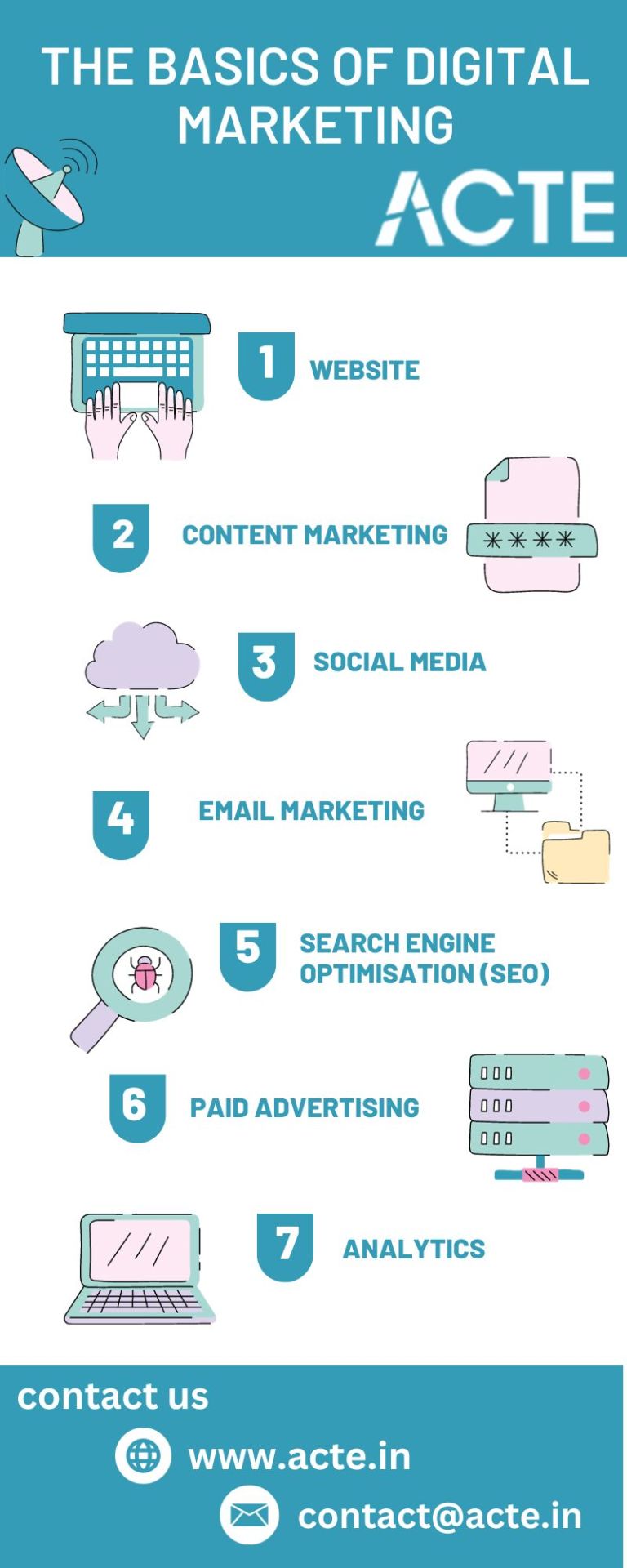
The Basics of Digital Marketing
Website: A well-designed website serves as your digital hub, equivalent to a virtual storefront. It’s crucial to make it user-friendly and informative.
Content Marketing: Creating valuable and relevant content, which includes blogs and videos, attracts and engages your target audience.
Social Media: Platforms like Facebook, Instagram, and Twitter enable audience connection, community building, and content distribution.
Email Marketing: Personalized emails to subscribers are highly effective for nurturing leads and keeping the audience informed.
Search Engine Optimization (SEO): Optimizing content and websites for search engines enhances visibility in relevant search results.
Paid Advertising: Utilizing platforms such as Google Ads and Facebook Ads extends your reach through paid promotional content.
Analytics: Tools like Google Analytics empower you to track online performance, facilitating data-driven decision-making.
Who needs digital marketing services?
A digital marketing strategy serves as a roadmap for your digital marketing efforts, outlining your objectives, target audience, and the methods for achieving these objectives. It helps maintain focus and optimize the allocation of resources. A well-crafted strategy should align with your audience, platform selection, content creation, and metrics for assessing progress.
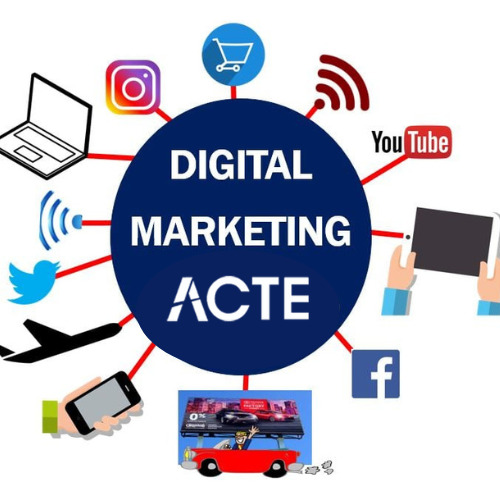
Who Benefits from Digital Marketing Services?
Digital marketing’s advantages span a wide range of entities, regardless of their size or sector. Whether you’re a budding local business, a global corporation, or a non-profit organization, a strong online presence is indispensable. It enables you to connect with your desired audience, boost brand recognition, and propel business growth. In today’s digital landscape, digital marketing services are transformative, ensuring that businesses of all types remain competitive and thrive.
Digital marketing is a versatile channel for businesses to engage with their online audience. Proficiency in its basics, coupled with a well-planned strategy, forms the foundation of success. Whether you represent a startup, a non-profit, or an established brand, digital marketing is the conduit to achieving your goals and thriving in the digital era.
Consider ACTE Technologies Digital Marketing Course, a top institute that provides comprehensive digital marketing courses, if you want to start your digital marketing path with experienced assistance. Their knowledgeable teachers can provide you with the skills and information you need to succeed in the field of digital marketing.
#digital marketing tools#what is digital marketing#digital marketing#digital marketing course#digital marketing training#digital marketing basics#digital marketing tips
3 notes
·
View notes
Text




#me#personal#sass#digital fairy#fashion#cyber baby#evil fairy#fairy girl#cute#fairy#ootd#alone#windy#baby girl#brown beauty#stock market basics
5 notes
·
View notes
Text
Tips & Tools
Which SEO tools do you use for your SEO work?

Get The Best SEO Tools.
#seotips#linkedin sales navigator#social media ads#search engine marketing#success#vps server#seo tools#digital marketing basics#digital marketing for beginners#digital marketing tutorial for beginners#make money blogging#bing ads#best marketing services
2 notes
·
View notes
Text
youtube
#digitalmarketing#learndigitalmarketing#marketingstrategy#contentmarketing#digital marketing basics#digital marketing tutorial#Youtube
2 notes
·
View notes
Text
#basics graphic design#what is graphic design#how many types of graphic design#digital art#marketing
2 notes
·
View notes
Text
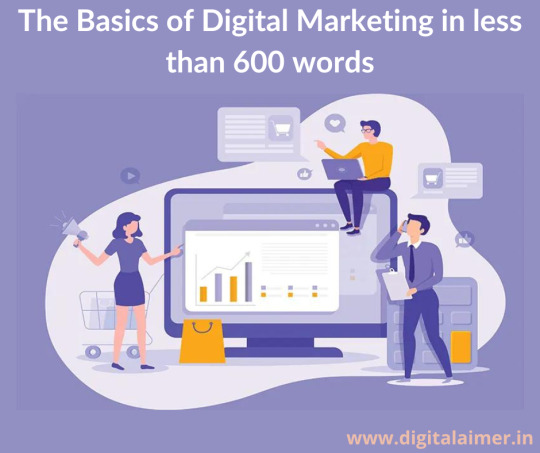
2 notes
·
View notes